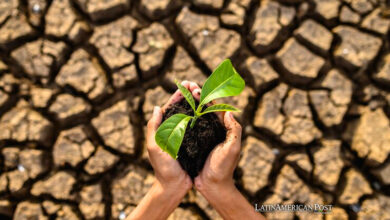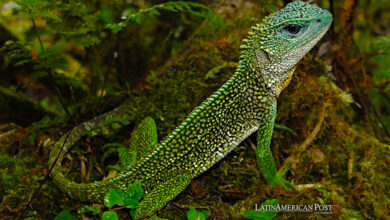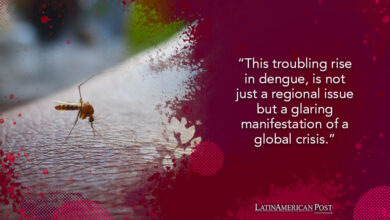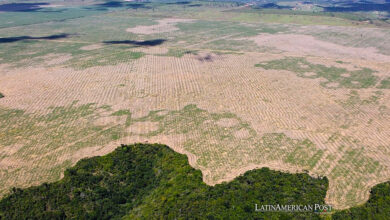Why insect extinction should matter to you
Factors such as the indiscriminate use of pesticides, soil degradation and the climate crisis make the existence of insects in natural ecosystems problematic. These are the reasons why insect extinction should matter to you.

Photo: Pexels
”
LatinAmerican Post | Brandon Martínez Salazar
With the disappearance of insects, we humans find ourselves facing an environmental problem that puts the world’s agricultural sustainability at risk. In other words, insects represent an essential value in nature that consists of providing the minerals and pollination that plants need to produce food.
It is important to point out that most people are not aware of the seriousness of the matter and, for this reason, it is essential to inform about the risk in which the food production of humanity is.
It is commonly known about the role that bees play in the pollination process of plants and also in the production of food. However, they are not the only ones who carry out such essential work. The diversity of insects is very large, but the fact that they have an extinction rate eight times higher than that of vertebrate animals should be cause for concern from now on.
For entomologists (professionals who study insects) the panorama is dramatic and the causes of this happening could be changes in land use, pesticides and the environmental crisis that is currently unleashing.
Why are insects so important and how do they contribute to nature?
Insects are important because some pollinate and others clean the land. For example, butterflies, flies or ants are in charge of giving the necessary yield to the flowers so that the fruits or vegetables are produced.
Also read: Drug Pollution: a Threat to the World’s Rivers
Now, according to the Spanish Entomology Association, in Europe, 70% of the population of flying insects has disappeared. This is extremely alarming because precisely these species depend on 35% of the food that is harvested, according to the productive sector. While for the Food and Agriculture Organization of the United Nations (FAO), the dependence on these animals for agriculture would be 75%.
Taking into account the monitoring that the European Environment Agency has done to this situation, the data shows that since 1991 butterflies and bumblebees have become extinct by 25%.
On the other hand, there are burrowing beetles. These fulfill the function of degrading the remains of organic animals. That is, they are in charge of decomposing and recycling the corpses. Likewise, other species also perform what is known as field cleaning. What they practically do is feed on the fecal matter of herbivores, allowing the soil where the cattle graze to be clean. The large tracts of land where cattle ranching takes place are problematic because they are usually full of excrement and there are not enough of these insects, therefore it is not sustainable.
For their part, cockroaches, which are considered scavengers for breaking down organic matter, are essential because they increase the level of nutrients in the soil. They are also great contributors at an ecological level because they help reduce waste quickly and without polluting. Although it is a species that is not in danger of extinction, the truth is that, if they were missing, the crisis for society, the environment and the economy would be enormous.
The economic cost of the disappearance of insects for agriculture
The financial effects on agriculture with this circumstance are critical because pollinating insects contribute millions of dollars to agricultural production. Therefore, the decline of these invertebrates in the field makes the investment more expensive.
In this sense, the specific causes that money is being lost and that the cost of production increases is due to the fact that man has changed the use of the land with anthropic activities such as deforestation, cattle ranching or the degradation of the land itself by intensive agriculture.
Another important cause of these events is the indiscriminate use of pesticides and biocides that have been exterminating the populations of insects that contribute their function to the life cycles of plants. If we add to that the current climate crisis and the forecasts of global warming in the long term, the panorama in the coming years will be discouraging for all people.
It is an issue that should be alarming all organizations in the world.
For the vice president of the Spanish Association of Entomology, José María Hernández, the rate at which insects are disappearing is already global, but no one is talking about the problem and its future consequences.
Possibly at this time they will not disappear entirely, but there is evidence of what is happening. However, what is really worrying is the little or no attention that has been given to the issue by animal organizations. It is good to fight for the preservation and protection of vertebrate animals, but invertebrates also have a reason to exist and that reason is directly related to the survival of humanity and the other species that inhabit ecosystems.
“It’s not that all insects are going to disappear, because they are a hyperdiverse group, but we are already seeing a drop in their richness and abundance, which could perfectly lead to an environmental catastrophe, no matter how much we don’t talk about it” Hernandez says.
In this way, if the alarm is not raised from the ecological societies of the planet, in the long term, humans will have to live with serious environmental and social consequences, which in themselves derive from the hand of man and his negligence in this regard.




